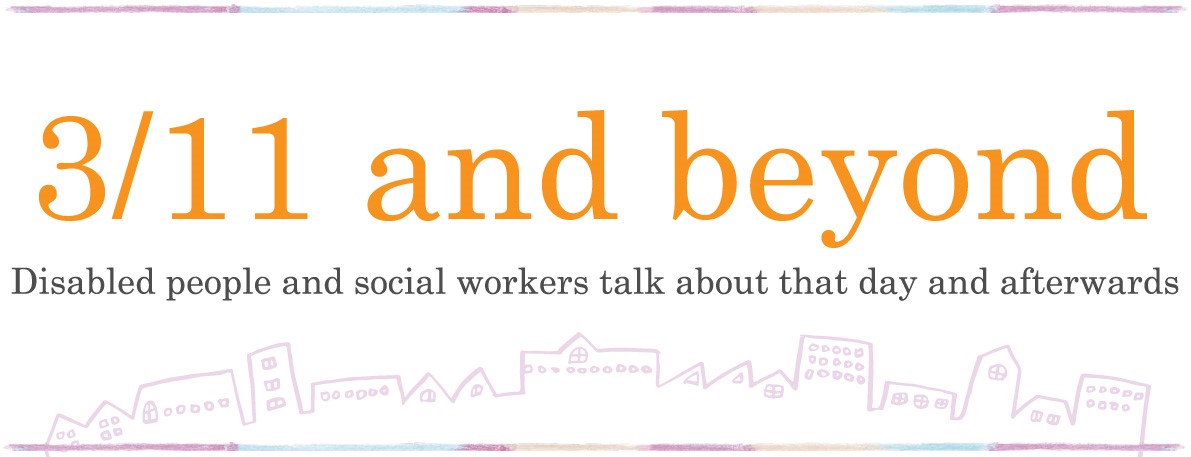 Story: Ms. Chie Matsuda (woman/ age 40 at the time/ hearing impaired)
Story: Ms. Chie Matsuda (woman/ age 40 at the time/ hearing impaired)Thoughts after experiencing the disaster
 Story: Ms. Chie Matsuda (woman/ age 40 at the time/ hearing impaired)
Story: Ms. Chie Matsuda (woman/ age 40 at the time/ hearing impaired)Do you feel like you’ve changed mentally or physically since experiencing the disaster?
Yes. I lost a lot of weight. My daughter did too. My daughter, who was in her first year of junior high school at the time, helped me with a lot of things, but she also panicked sometimes. What my daughter hated the most were the warning announcements. She got scared every time there was an announcement that water levels would rise or the roads would be blocked if it rained. Whenever there was an aftershock, we would immediately wake up, grab our things, and leave the house. It was really mentally exhausting doing that over and over.
We put a bunch of portable LED lamps and flashlights in our rooms to make sure we had lights when we went to bed so we could take those and immediately flee if something happened. We still have them now. Food, too. We still stock up even now.
So your disaster prevention awareness has increased. What were you doing to access emergency information before the disaster?
I accessed it through TV and my smart phone. I used apps and stuff. Whenever my daughter is gone at school or something, I can’t get any information orally, so I get it by watching my smart phone and the TV. When I’m out, I often think it would be nice if there were electric notice boards or something. In my case, I have to go ask people in writing what happened, or use my intuition to try to interpret what people around me are saying. If I keep asking over and over, after a while hearing people start to avoid talking around me because they don’t want to be rude, and then I start to feel bad about bothering them. I would be grateful if there was something I could see visually in addition to audio broadcasts.
After experiencing this disaster, do you have any advice or suggestions on preparations we should make for hearing impaired people?
I saw on the news about the Kumamoto earthquake that some families with hearing impaired members didn’t get information and missed food distributions for three days. I know the situation of each shelter is different, so if you’re hearing impaired I think it’s important to tell your neighbors you can’t hear, and although it might make you uncomfortable, you have to tell them with a smile. Rather than looking pained or disgruntled, if you just say, “Could you help me out?” people will say “Sure.” I heard one deaf person say, “When I’m the only deaf person surrounded by a bunch of hearing people, I tend to hold back and feel somehow ashamed.” One disabled person also said, “Putting abled and disabled people in separate rooms might also be a good idea.”
What sorts of things should hearing people be aware of when helping hearing impaired people?
Since you can’t identify a hearing impaired person by looking at them, I think it’s important for hearing impaired people to tell those around them that they can’t hear. You have to tell them yourself. But there are some people who don’t say anything. Of course this also depends on individual personalities. There are also some people who get frustrated, thinking, “No one helps me even though I can’t hear.” So I think it would be easier if supporters would start by writing on paper, “Is there anyone who can’t hear?” “Does anyone have a disability?” “Is anyone ill?” “Is anyone on medication?” They should check for these things first and then respond accordingly. I think it would be good if everyone could see and share this information before receiving support.
Is writing the simplest way to communicate with a hearing impaired person if you don’t know sign language?
Yeah, I think writing is best, but gestures are also effective.
Is there anything you want hearing people to know? Any requests?
Yes. Hearing people can listen to conversations or warning announcements to find out a tsunami is coming, but people who can’t hear don’t know. When an emergency happens, I would be grateful if hearing people would include hearing impaired people. Even just taking us by the hand or a piece of clothing is fine. Rather than acting of their own accord, I think hearing impaired people tend to evacuate by watching and imitating hearing people. If you don’t have any paper, you can make do by writing on your hand or using gestures or facial expressions to help hearing impaired people evacuate with you. It’s fine to split up after that. I’m talking about immediately after the disaster happens.
Then you also need flashlights. We can communicate by writing on paper or typing on a smart phone screen and showing it to hearing people. A flashlight is essential so we can help them see in dark places. Now there are convenient apps that enlarge the letters you type. When we don’t have anything to write on, we use smart phones and such to transmit and receive information. But when the battery dies, it’s over. When the battery gets low, you get anxious.



